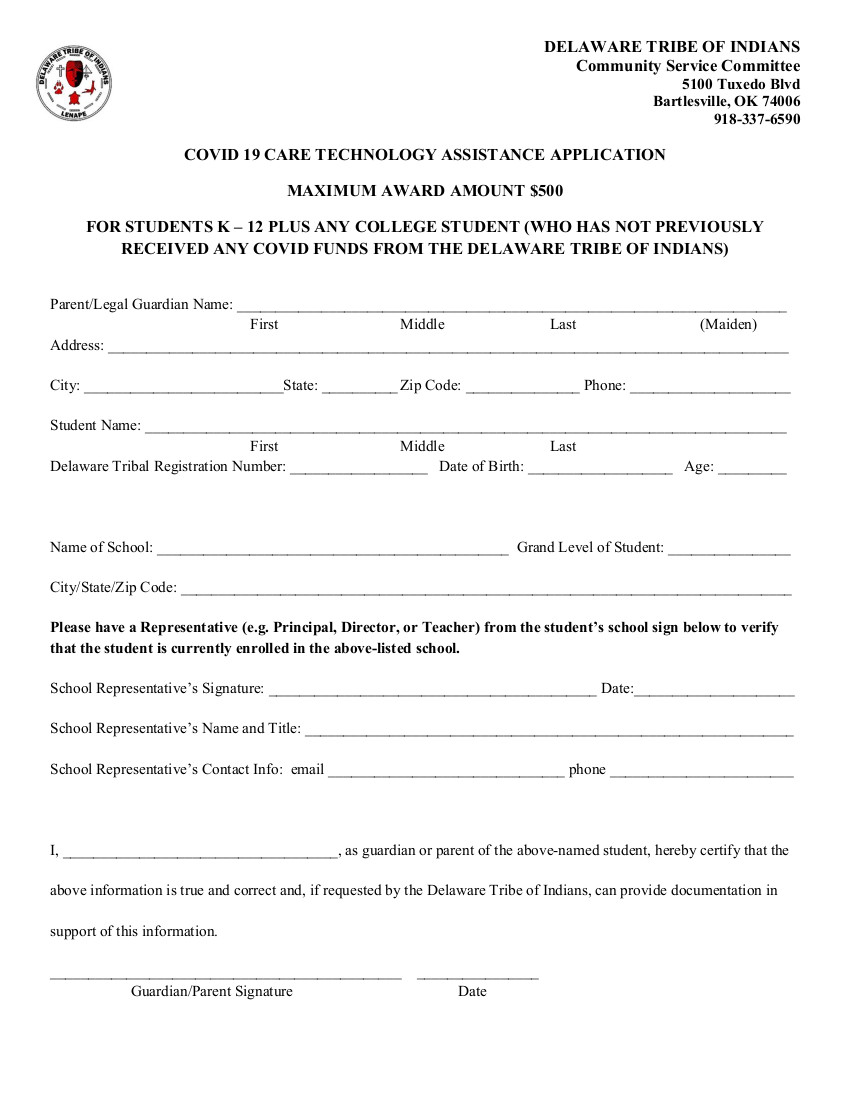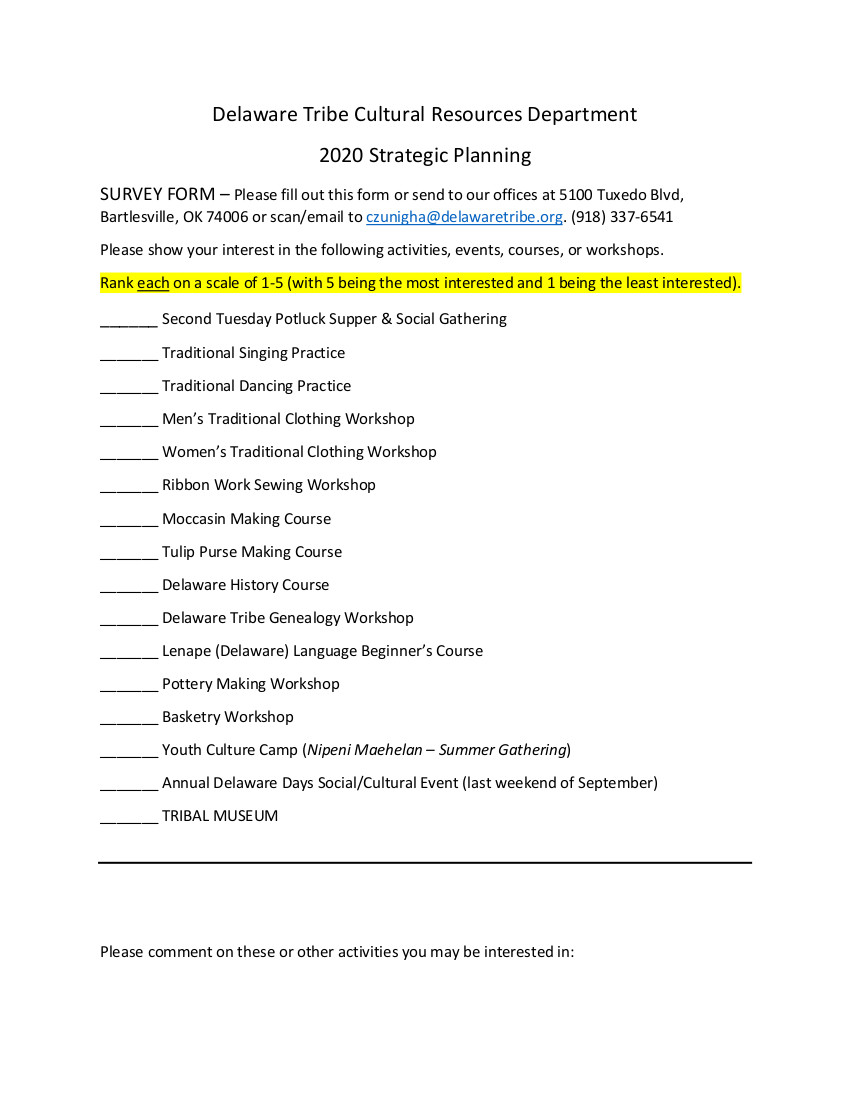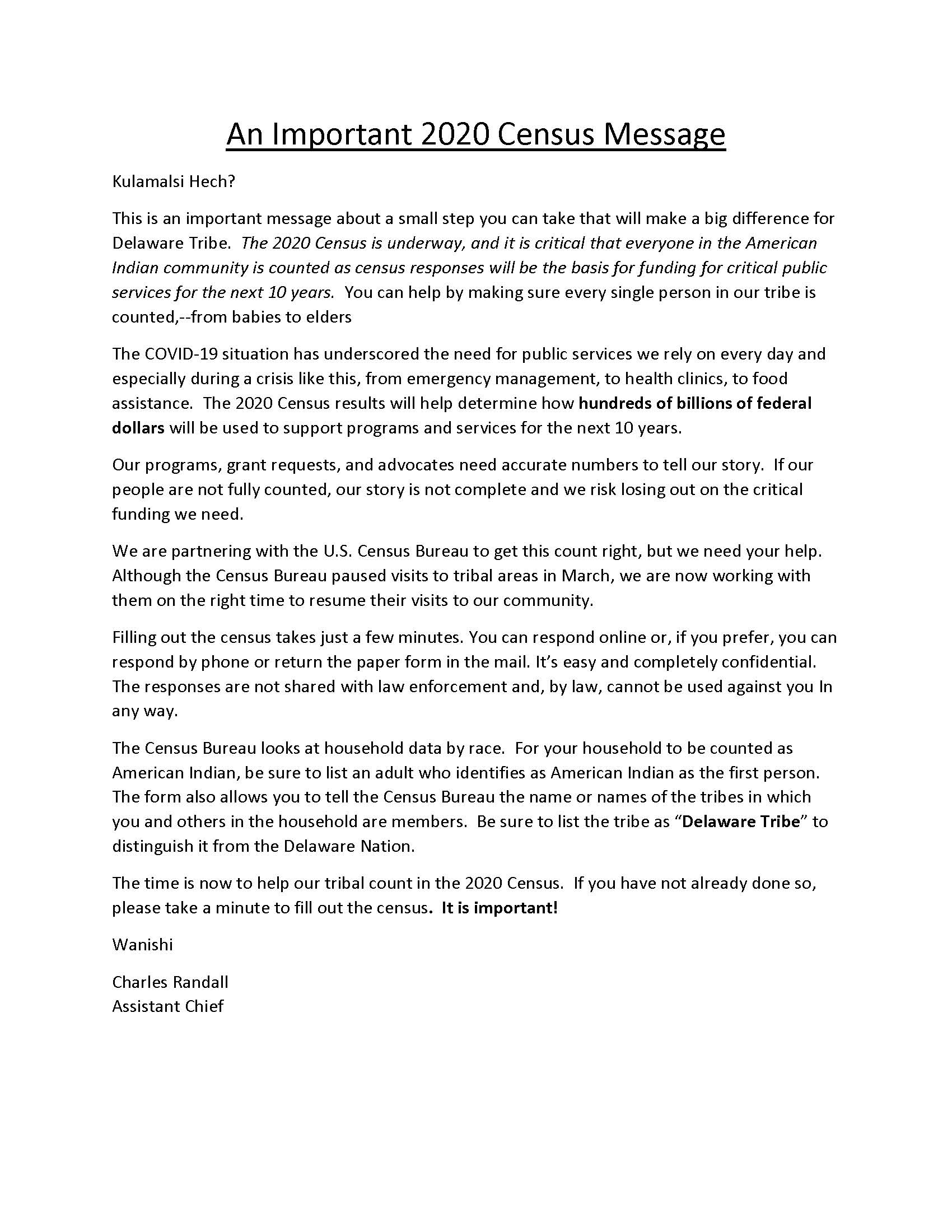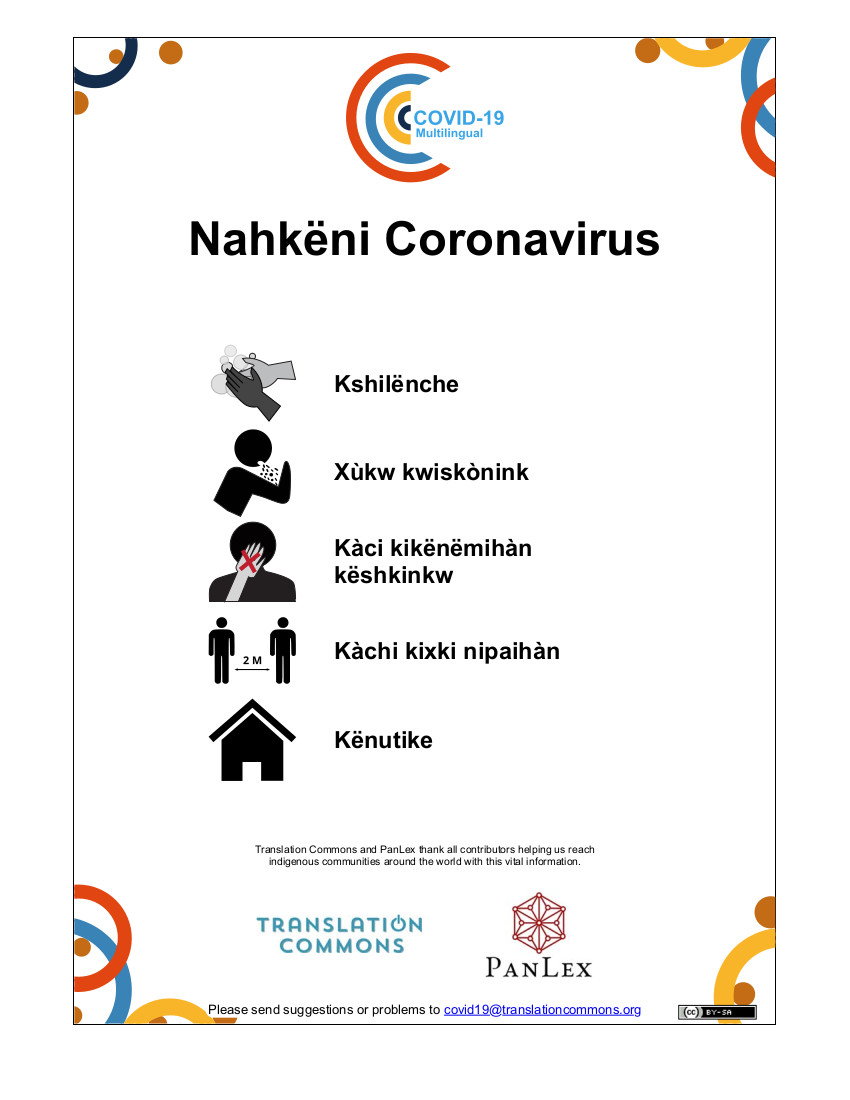FrontPage
now browsing by category
Has Your Housing Program Waitlist Information Been Updated?
If you have been placed on a waitlist with the Delaware Tribe of Indians Housing Program please email the Housing Specialist, McKenzie, at mloffer@delawaretribe.org with a current phone number, email, and mailing address to maintain your waitlist status.
If you are interested in applying for Housing, please scan the code on the flyer below or click here to access our Housing Program Application. Applications and ALL REQUIRED documents can be mailed to:
Delaware Tribe of Indians Housing Program
5100 Tuxedo Blvd.
Bartlesville, OK 74006
Strategic Plan For a Cultural Center
The Delaware Tribe Cultural Center will focus on the needs and wants of the tribal community. It will provide cultural education through classes, lectures, and training programs. It will also serve as a gathering space for presentations about history, culture, art, music, dance, storytelling, feasts, and ceremonial activities/events.
The Delaware Tribe of Indians Cultural Center is a function of the tribal government as authorized by its tribal membership. The Tribe will perpetually maintain a Cultural Center that will house a Cultural Resources Department. The Cultural Resources Department staff will work with the tribal administration to obtain the funding necessary to perpetually maintain the Cultural Center.
The department will consist of programs and functions organized, managed, and conducted by a staff of tribal employees and volunteers.
For more details, click on the link below for the full plan. Also presented is the Tribal Council resolution approving the plan.
Strategic Plan For a Cultural Center
COVID-19 Emergency Rental Assistance Program Application Now Available
The DTIs’ IHBG (Indian Housing Block Grant) COVID-19 Emergency Rental Housing Assistance Program is designed to assist low income Native American families with emergency rental housing related assistance. Assistance may include deposit and/or monthly rent, temporary lodging, lot/site rental for manufactured housing, and may also include utility charges, but DOES NOT include repairs or installation of items for the unit. Current residents of DTI affordable housing are not eligible for this assistance.
This program is limited to one-time assistance and is only to be provided during the COVID-19 pandemic emergency and is provided on an urgent basis and is temporary in nature and must be used in prevention, preparation and/or response to the COVID-19 pandemic.
This assistance can only be provided to those families who have not yet received any similar assistance from the Delaware Tribe or other source. Special exclusions or restrictions on units built prior to 1978 apply, due to lead-based paint requirements. In no such case shall the term of the assistance or lodging provided exceed 100 days regardless of whether or not the entire $1,000 award has been exhausted. The Delaware Tribe reserves the right to recapture or award a lesser amount in such cases. If approved for assistance, the voucher will be mailed directly to the vendor, landlord or utility company.
INSTRUCTIONS: Please read carefully and submit a completed application with all required documentation. Incomplete applications will not be processed. Due to the flexibility of the program, applicants must submit documentation specifically related to their request for assistance. Applications may be submitted online with electronic documentation with some sections completed verbally over the telephone.
- Verification of Tribal enrollment with a federally recognized tribe for Head of Household OR Spouse, CDIB card, Tribal ID OR official correspondence from the Tribal enrollment office OR Bureau of Indian Affairs are all acceptable forms of documentation.
- Identification for everyone listed on the application. Choose one from this list: Driver’s License OR State Identification Card OR Birth Certificate OR Tribal ID Cards OR CDIB. Name changes may be documented by birth certificates, marriage certificates or divorce decrees.
- Social security card or numbers for everyone listed on the application.
- Income verification for everyone 18 yrs of age or older. Third party verification is preferred on the form provided. Check stubs, payment statements, prior year tax returns may also be used, and a transaction report from BIA for last 12 months if you own trust/restricted property. If paper copies are not readily available, a self-certification form may be used or verbal self-certification may be provided over the telephone or through email. All are acceptable forms of income verification.
- Copy of marriage license (if applicable).
- Copy of dwelling lease/rental agreement that is compliant with the Oklahoma Landlord-Tenant Act, and/or documentation from a hotel/lodging establishment, utility company, cooperative or municipality with the amount due. This documentation may be provided over the phone with a receipt to follow upon payment.
- Applicants shall provide a statement that you have not been awarded and received any other emergency rental or similar assistance during the COVID-19 pandemic.
>>>APPLICATION (PDF)
ATTENTION STUDENTS: COVID-19 Care Technology Assistance Application Now Available
ATTENTION STUDENTS
THE DELAWARE TRIBE OF INDIANS
WANTS TO HELP YOU WITH YOUR DISTANCE LEARNING!
Funds are available for technology and other items to assist with your distance learning needs.
Please see the attached application for details.
Delaware Tribe Awarded CARES Act Grant
For Immediate Release
July 27, 2020
Curtis Zunigha, Cultural Center Director
czunigha@delawaretribe.org
(918) 337-6541
The Oklahoma Department of Libraries (ODL) has awarded a $1,000 PPE grant to the Delaware Tribe to help the Cultural Center purchase personal protective equipment (PPE) and supplies to keep staff and visitors safer during the COVID-19 pandemic.
The Delaware Tribe is one of 64 institutions to receive a grant from ODL courtesy of the federal CARES Act and the Institute of Museum and Library Services (IMLS). A total of $60,000 was distributed by ODL to address the coronavirus concerns of public libraries, tribal libraries, tribal cultural centers, museums, and historic sites in the state.
Curtis Zunigha, Director of the tribe’s Cultural Center, said the funding will be used to provide masks, gloves, face shields, protective barriers, hand sanitizer, and signage to maintain social distancing.
“It looks like we may be dealing with this virus for some time, so it’s very important that we follow CDC guidelines approved by our Tribal Council as we open up services to the public,” Zunigha said. “This grant will provide supplies we need to help reduce risk of exposure for our employees and visitors. Our mission is to serve our tribe and community, and we want to continue that mission in the safest way possible.”
The Cultural Center and other tribal offices initially closed due to the pandemic on March 18. They temporarily reopened July 1 to employees-only so that the buildings can be prepared for a public opening. That date remains to be approved and announced by the Tribe.
In developing the grant, ODL Director Melody Kellogg said institutions were surveyed about any hurdles they might face in returning to service during the pandemic.
The top concerns of libraries, museums, and other cultural institutions were a shortage of cleaning supplies and PPE equipment, fear on the part of staff and the public, and the challenge of enforcing social distancing and other best-health practices in their facilities.
“We developed the grant proposal to help address these concerns,” Kellogg said. “We were very fortunate in that we were able to provide some funding to all 64 of the eligible institutions that applied.”
The PPE grant is the first of two that will be available from ODL, with funding from IMLS and the CARES Act. The grants were designed to help the state’s important cultural institutions address two impacts of COVID-19: public health concerns, and the need to breach the digital divide and improve digital inclusion to better serve the public.
“The pandemic has thrown a spotlight on the digital divide in our state and nation,” Kellogg said. “At a time when, for safety reasons, we are depending more than ever on electronic communication, far too many of our fellow citizens don’t have the tools or access needed to take advantage of important services.”
Recipients of the Digital Inclusion Grants, totaling $291,320, will be announced later in July.
A complete list of Oklahoma’s 64 PPE Grant recipients is at: news.oklibshare.org/federal-funding/odl-awards-cares-act-ppe-grants-to-64-institutions.
The federally-recognized Delaware Tribe of Indians is headquartered in Bartlesville. While their origins are in the Pennsylvania/New Jersey area, their history includes forced migrations west. They arrived in Cherokee Nation Indian Territory in 1867 and settled along the Caney River. The Cultural Center includes a library, museum (under construction), archives, research center, language program, cultural activities and events, and the Gift Shop. More information can be found at www.delawaretribe.org.
The Oklahoma Department of Libraries is the official state library of Oklahoma. The agency serves the information and records management needs of state government, assists with public library development, coordinates library and information technology projects for the state, and serves the general public through its specialized collections.
The Institute of Museum and Library Services works to advance, support, and empower America’s museums, libraries, and related organizations through grant-making, research, and policy development.
Delaware Tribe Cultural Resources Department 2020 Strategic Planning Survey
The Cultural Resources department is currently receiving funds from three agencies to support our mission. (1) U.S. National Parks Service – Tribal Heritage Grant, (2) Oklahoma Department of Libraries – Coronavirus mitigation/PPE supplies, (3) Oklahoma Historical Society – Strategic Planning. We need to continue the strategic planning activities even though we’re closed for public interaction. Therefore we are reaching out to tribal members and ask that you complete the following survey (click on image to access PDF):
Lenape Words to Use During the Coronavirus Pandemic
From the Lenape Talking Dictionary – http://talk-lenape.org
kshilënche – wash your hands
kshilënchekw – you all wash your hands
kshilënchèch – you will wash your hands
(not a command, just a statement of a future action)
mëtakham ktun ok kwikiyon – Cover your mouth & nose
kpilakhom kwikin – Clean your house
nutike – stay home or I stay at home…
nutikekw – you all stay home
nutikehënàch – we will stay at home
nutikehëna – we stayed home








 D5 Creation
D5 Creation